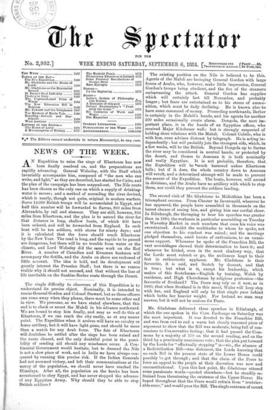The single difficulty to observers of this Expedition is to
ttiderstand its precise object. Nominally, it is intended to rescue General Gordon and Colonel Stewart, but as those officers can come away when they please, there must be some other end in view. We presume, as we have stated elsewhere, that this end is to check or arrest the Mahdi in his advance northward. We are bound to stop him finally, and may as well do this at Khartoum, if we can reach the city easily, as at any nearer point. The Expedition when it arrives will have no cavalry or horse artillery, but it will have light guns, and should be more than a match for any A.rab force. The fate of Khartoum will doubtless be settled after the siege has been raised and the route cleared, and the only doubtful point is the possi- bility of sending aid should any mischance occur. A Con- tinental Government would hesitate, but to descend the Nile is not a slow piece of work, and in India we have always con- quered by running this precise risk. If the Indian Generals had not assumed victory, and left their communications at the mercy of the population, we should never have reached the Himalaya. After all, the population on the banks has been accustomed to obey Egypt, and has never stopped the advance of any Egyptian Army. Why should they be able to stop British soldiers ?


































